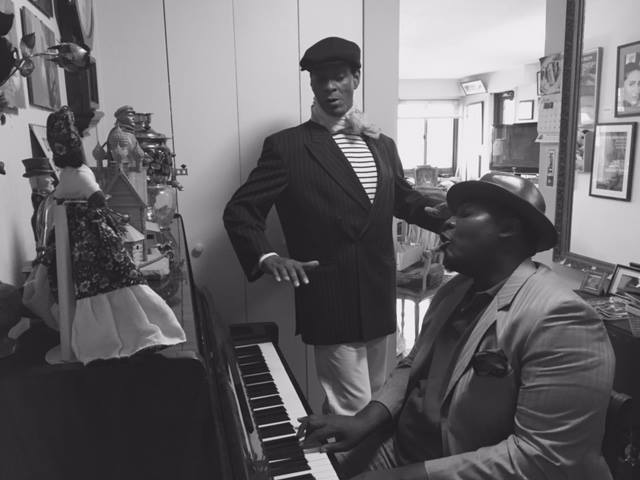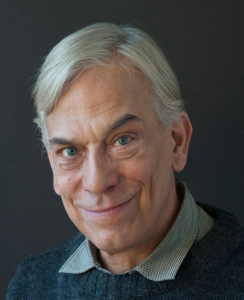
A Preface by John Farrell (Director)
Sophia Romma is not your ordinary playwright. She is, rather, in a class all by herself. While some of her work conforms (slightly) to more conventional models (I conjure up, for example her elegiac portrait of exiled bi-sexual Russian poetess, Marina Tsvetaeva, the heroine of her play from The Past is Still Ahead, (which I have also had the pleasure of directing); it is with a play like That Queer Blind Silence that Romma’s enigmatic brilliance can be seen with full-on flashing lights. I say enigmatic in the sense of a mathematical paradox or a puzzle. There are many moving parts in Sophia’s play—a kaleidoscope of actions, motives and allusions that only reveal themselves when one approaches the text with newly opened eyes. Pay attention to what is there, not what you think may be there! At first glance, one could be forgiven (partially) for mistaking this play as a variation on the old "inmates running the asylum" theme, but that reading runs the risk of missing the play's ethos entirely, for Romma’s asylum is a battlefield of elemental impulses both embodied and inferred, each and every one demanding our keen attention. Romma's characters and situations do not so much evolve as they explode and the audience is advised to take cover! At times it seems to SHOUT: “Our political climate breeds a crisis for humanity; why are we just standing there? Our fundamental rights are in jeopardy! Take action this instance!”
In Romma’s world that Venn diagram of sexual, intellectual and spiritual chaos finds expression in the rise of Vladimir Putin. In many respects, the play feels prescient as the issues raised by the Sochi Olympics dating back to 2014 have only grown more urgent and grotesque. Putin may be a tyrannical monster, but he is a monster of our own, perhaps unintended, invention; like a poisonous gas he fills the rupturing fault lines of our dark, discordant worlds. He consumes the places we refuse to acknowledge; a malignant expansion super-charged by the denials and conflicts each and every one of us harbours. Nevertheless, this theatrical madhouse created by Romma is not a mere metaphor for a world peopled with tabloid celebrities, even if its occupants (Paul Robeson, Edward Snowden, Johnny Weir, Masha Gessen along with the cameo appearances of other renowned public personas) certainly fit that bill. I suggest instead that Romma offers us a world that is beyond metaphor; that its “is-ness” cannot be reduced to a play of symbols. The here-and-now presented by That Queer Blind Silence is not so much a mirror of the world as it is the world and that world, alive with all its contradictions, delusions and inchoate desires is not a pretty in pink sight.
The challenge in directing this unique play is to be quite certain and give Romma’s verse the oxygen which it needs; allow for every line and every action to breathe into the life required. Only then one will begin to find that the play’s seemingly disparate, even irreconcilable parts, come together, illuminating each other in ways that may remain evasive to even the closest of readings.
John Farrell’s Brief Biography

John Farrell is an Irish writer-director-broadcaster who has staged numerous plays and events in both Ireland and New York across a career spanning nearly half-a-century. Farrell’s first paying job in theatre came when he was thirteen years old, as a member of actor/director Geraldine Fitzgerald’s legendary Everyman Company in New York City. After attending Columbia University, Farrell returned to Ireland where he was to build a career as an influential Theatre Director and Arts Administrator, journalist, critic, television personality and radio broadcaster. He returned to New York in 2010 and has been delighted to serve as director of Sophia Romma’s extraordinary award-winning stage-plays. He has had the pleasure of staging Romma’s play, Carte Blanche at Polaris North Theatre Collective and at The Midtown March Madness Short Play Festival. He has also directed That Queer Blind Silence at the 13th Street Repertory Company and co-directed The Past Is Still Ahead at The Montauk Library for the “Women Celebrating Women in History Series.”
Jonathan Slaff (Publicist)
Press Agent’s Note
I treasure my two memorable decades of working with Sophia Romma as her press agent and publicist and our collaborative artistic relationship which continues to prosper because Sophia’s plays enlarge my awareness and scope—on a psychological, emotional, political and theatrical level. Occasionally, Sophia’s plays are truly prophetic. I have learned from "That Queer Blind Silence" what it feels like to live in a fascist kleptocracy in free-fall, in which a country is governed by regular attacks on chosen enemies. "That Queer Blind Silence" deals with the repression of the LGBTQ Community in Russia during and after the time of the Sochi Olympics. The play exquisitely articulates, in its own singular style of verse, the descent into paranoid anxiety that has been forced upon Russian society as a result of Putin's fascism. In the period of his consolidation of power, the Russian state has become vulnerable through election fraud and support of criminal oligarchs. Putin's solution has been to blame imaginary opponents for corruption of what we might as well call the "Russian ideal." The opponents included "Western Stooges" (like Hillary Clinton), Jews and homosexuals. Furthermore, an association between opposition and treason has been taken for granted and free-thinkers as well as ethnic minorities in contemporary Russia have found themselves held up as enemies of the people. Russia is a failed state, but thanks to Putin, it is being re-envisioned not as a country but as a spiritual condition, a civilization, which will not abide by the rule of law or a succession principle. It unsettles the mind to think of that kind of a country, yes it does. To be able to grasp and to fully picture the unsettlement these tyrannical regime actions churn is the creative challenge this play rises to.
Like many Americans, I was not aware of Russia's plunge into darkness at the time of the Sochi Olympics in 2014. While our government pursued a "reset of relations," most of my countrymen and I overlooked the warning signs, preoccupied with our daily lives and financial pressures, confident to leave important matters to a capable American president. Besides, it was better to have a strong man in charge in Russia than anarchy. At least somebody, we hoped, could protect the Soviet nuclear arsenal from
being pilfered and distributed around the world. We were especially unsuspecting that Putin's tools of fascism would soon be exported to new shores. We needed to wise up.
Politically speaking, it is far from incidental that Putin's target was homosexuals in the context of this play and upon reflection of Russia’s past discriminatory history against sexual and ethnic minorities. It is truly disturbing that today gay athletes are an object of fear; tomorrow it shall be somebody else. Any scapegoat will do when a political leader, fashions fictional problems such as the permanent encroaching hostility of a decadent West. I did not fully comprehend this concept in 2015, when I was working with Sophia on this play. But I get it now. Is America going to be living tomorrow in the same state of mind as Russia was in 2014, or is today?
The flavor of our discontent will depend on how fascism reinvents itself for our New World realities. Meanwhile, in Mueller we trust. And we gird our loins for the 2018 midterm elections. We will not have peace of mind until the ordeal is over. I can no longer say that my fate is somebody else’s problem, "but for the grace of God, there go I." Sophia Romma's portrait of the hateful rhetoric and prejudice waged against the gay population, against governmental non-conformists and the muted voices of the press in 2014 Russia is a potent warning to us all. That is what lies in store for the American people, if we fail to perceive the lurking dangers of a totalitarian state and if the rule of law does not prevail. That is the reason behind Masha Gessen’s support of Ms. Romma’s poignant theatrical masterpiece. Perhaps if we heed the screeching alarms of the messenger, we may still prevent future bloodshed.
Jonathan Slaff’s Brief Biography
Jonathan Slaff has been an independent theatrical press agent since 1988. He has proudly served as Dr. Romma’s press agent and publicist since Sophia’s debut play “Love, In the Eyes of Hope, Dies Last” at La MaMa Experimental Theater Club in 1997. Pursuant to La Mama’s production of Sophia’s surreal play, Mr. Slaff has continued to be the press agent and publicist for Romma’s cycle of phantasmagorical Obie-nominated plays in quantum verse, produced at La MaMa E.T.C., namely, “Coyote, Take Me There” and “Defenses of Prague.” Slaff was also the press agent for Romma’s international cycle of theatrical productions: “Shoot Them in The Cornfields!” at the Producers Club Theatre and at the American Theatre of Actors, “Absolute Clarity” at Players Theatre, “The Past Is Still Ahead” and “The Mire” at the Cherry Lane Theatre.

Mr. Slaff performs media relations and audience development services for cultural institutions, professional theater and dance companies, fundraising and civic events, government agencies, NGO's and self-producing artists of various kinds, primarily in New York City and vicinity. New York theatrical clients have included La MaMa Experimental Theater, Shakespeare in the Parking Lot, Theater for the New City, New Federal Theatre, The Negro Ensemble Company, Inc., Czechoslovak-American Marionette Theatre, The Drilling Company Theatre, Workshop Theatre Company, Kings County Shakespeare Company, The Yip Harburg Foundation, The American Place Theatre and Ubu Repertory Theater. Musical clients have included violinist Mari Kimura and two Klezmer attractions, The Klezmer Conservatory Band and The Klezmer Mountain Boys. Artists represented have received seventeen Obies, three Bessies, Lucille Lortel, Theater World, and Outer Critics Circle Awards. His success stories include the launch of one of New York's most successful and cutting-edge theatrical attractions, Blue Man Group. Mr. Slaff is also an actor.
https://www.broadwayworld.com/article/THAT-QUEER-BLIND-SILENCE-to-Play-13th-St-Rep-85-23-20150804
Garden of the Avant-garde and Theatrical Foundation presents:
That Queer Blind Silence
A new Political farce by Sophia Romma.
